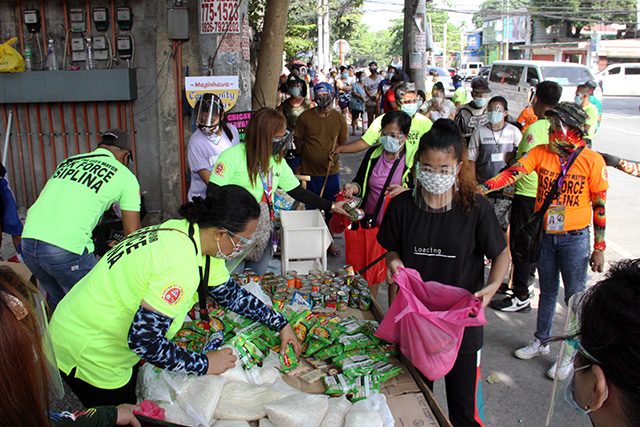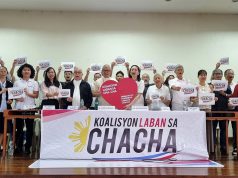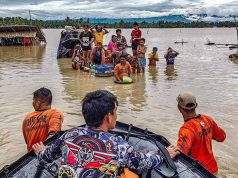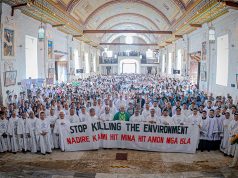
Where did the concept of community pantry come from?
Zadka
Zia Alonto Adiong, Bangsamoro Transition Authority Parliament member for Lanao del Sur, shared on Twitter that the bayanihan concept is an obligation of Muslims to their communities.
“The concept of community pantry is Islamic. We call it Zadka meaning charity in English. We Muslims do not just see this as a matter of personal choice but in fact part of our obligation to the community we’re in,” Adiong wrote.
The concept of Community pantry is Islamic. We call it Zadka meaning charity in English. We Muslims do not just see this as a matter of personal choice but infact part of our obligation to the community we’re in.
— Zia Alonto Adiong (@ZeeAlontoAdiong) April 20, 2021
Zadka or Zakat is one of the five fundamental pillars of Islam, according to The National News, a digital news publication from the Middle East.
There are five pillars—Fasting, Prayer, Hajj, Shahada and Zakat.
“Zakat is mandatory to all adult Muslims who earn a minimum amount of money each year — known as nisab,” read the article.
“Traditionally, the nisab threshold was 87.48 grams of gold or 612.36g of silver. As a result, the monetary value of nisab varies according to current prices and currencies,” it added.
A Muslim scholar named Sheikh Dr Ahmad Al Kubaisi was also quoted as saying that Zakat is similar to taxes.
“It’s not a strange concept to modern countries. Zakat is basically like taxes but, while taxes go towards the country, zakat goes to those who are in need,” he said.
Community kitchen
Activist Lean Porquia likewise shared that the concept of the community pantry is similar to the community kitchen progressive groups organized during the first year of the pandemic last year.
“Hindi na bago ang #CommunityPantry. Last year meron nang #CommunityKitchen and my Tatay was killed because he organized one in Iloilo. Sabi nga nila, you can kill an activist, but never their activism,” Porquia wrote.
Porquia is the son of activist leader Jose Reynaldo “Joy” Porquia who was gunned down in Iloilo City in May 2020.
In Australia, a community kitchen is defined as “a group of people who meet on a regular basis to plan, cook and share healthy, affordable meals.”
“Community Kitchens Groups are for everyone, and can be run anywhere there is a kitchen (churches, schools, neighborhood houses, community health services, workplaces, Men’s Sheds etc.),” an Australian community kitchen organization said.
Kindness Stations
Caritas Philippines, the social arm of the Catholic Church in the Philippines, hailed those who put up community pantries and recalled that in April 2020 it launched a similar initiative.
Its executive secretary Fr. Antonio Labiao cited that they launched Caritas Kindness Stations which also empowers the community to “take what you need, spare some for others, and give what you can.”
Fifteen provinces now have their own Caritas Kindness Station.
This concept is from a group of friends in Sorsogon City. They started with P1,500 used to buy canned goods, noodles, crops and half sack of rice. Other donors started to share goods too, and stations multiplied in other areas it added.
Caritas Philippines national director Bishop Jose Colin Bagaforo said the emergence of community pantries “is one of the most Christian responses at a time when self-preservation and addiction to power are very eminent.”
Rise of community pantries
Community pantries sprouted in various communities in Metro Manila and in some provinces after organizer Ana Patricia Non launched the initiative in Maginhawa Street in Quezon City last week.
READ: Bayanihan in action: Filipinos replicate Maginhawa community pantry to help pandemic-hit residents
These private sector-led initiatives were launched to help Filipinos severely affected by the still ongoing coronavirus pandemic amid the delay in the national government’s financial aid.
“Di nito masasagot ang root cause ng kagutuman pero okay na ring pantawid-gutom sa mga nangangailangan. Mahirap magtrabaho, mag-aral at lumaban habang kumakalam ang tiyan,” the 26-year-old wrote last week.
Amid the initial success, Non and other organizers recently bared online fears for their safety after some local police inquired about their personal information.
The National Task Force to End Local Communist Armed Conflict and the Quezon City Police District also previously shared posts that linked the initiative and its volunteers to the communist rebellion without proof.
READ: Calls to ‘protect community pantries’ grow as red tagging fears halt Maginhawa effort
The post from the QCPD, however, had since been deleted. It also apologized for the post.
Such red-tagging prompted Non to temporarily suspend the community pantry in Quezon City on Tuesday
A discussion between Non and Quezon City Mayor Joy Belmonte followed where the local mayor assured community pantry organizers of their full support.
Non reopened the Maginhawa community pantry to the public on Wednesday.
“Iba talaga ang lakas ng bayanihan ng mga Pilipino pag nagtutulungan. Lahat ay welcome dito, walang pinipili edad, kasarian, kapansanan, relihiyon, ethnicity, at socio-economic class at politikal na paniniwala. Tuloy ang ating mutual aid natin! Mabuhay po tayong lahat!” she said.









